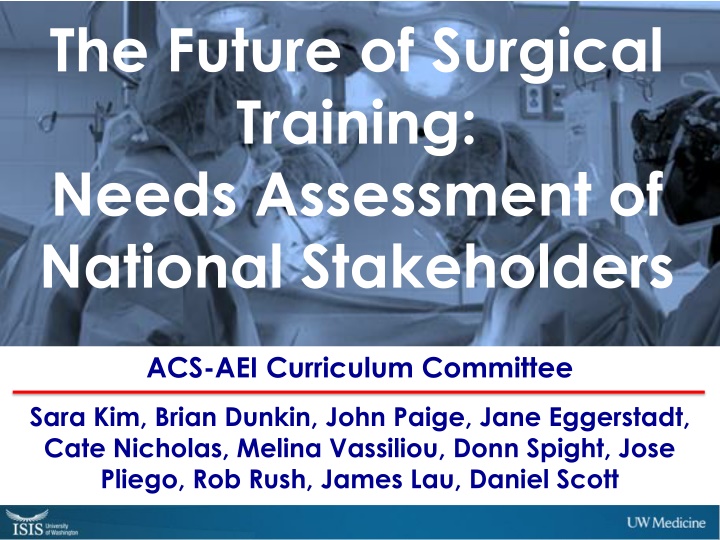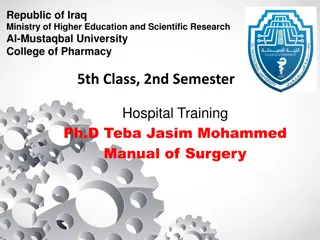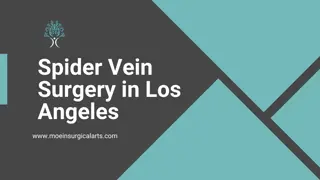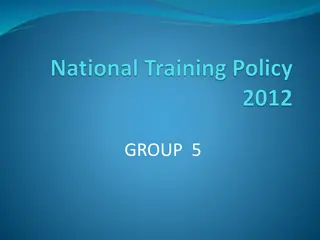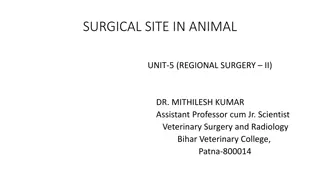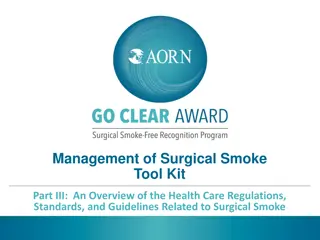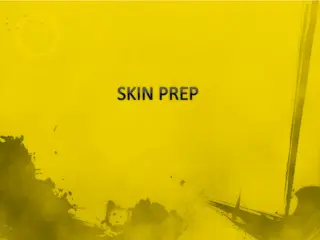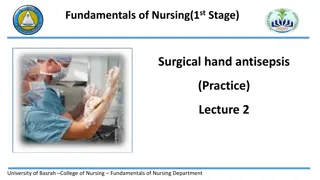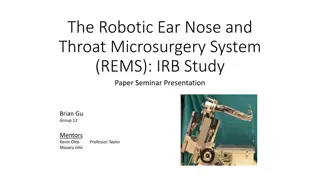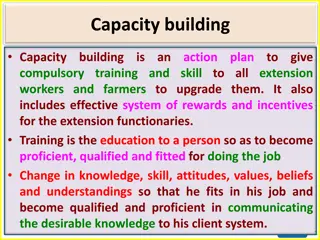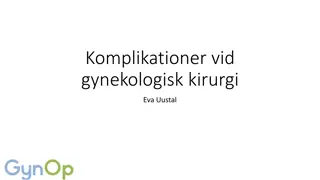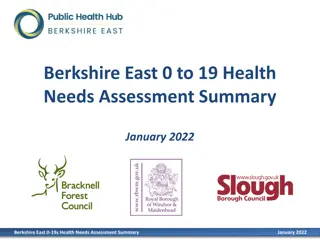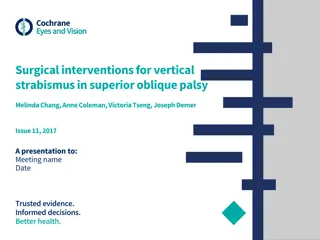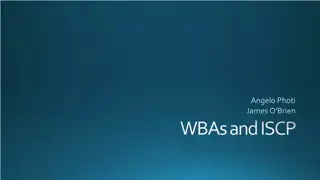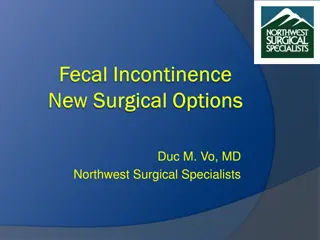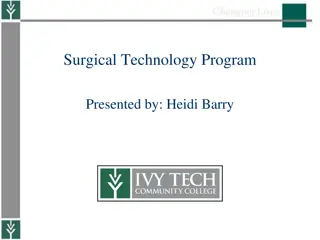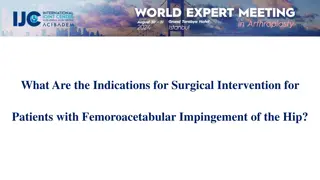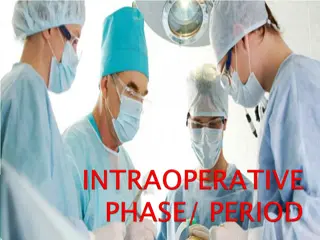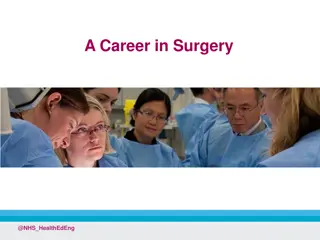Future of Surgical Training: Needs Assessment of National Stakeholders
This study delves into the gap between ideal and actual surgical practices, aiming to enhance future surgical training by addressing key issues and providing educational solutions. Through qualitative analyses of interviews with various stakeholders, including surgeons, clinicians, educators, and administrators, the study explores how surgeons can improve patient care, the best learning methods for surgeons, and the importance of educational programs in addressing surgical challenges. The findings aim to inform and guide advancements in surgical training for better patient outcomes.
Download Presentation

Please find below an Image/Link to download the presentation.
The content on the website is provided AS IS for your information and personal use only. It may not be sold, licensed, or shared on other websites without obtaining consent from the author.If you encounter any issues during the download, it is possible that the publisher has removed the file from their server.
You are allowed to download the files provided on this website for personal or commercial use, subject to the condition that they are used lawfully. All files are the property of their respective owners.
The content on the website is provided AS IS for your information and personal use only. It may not be sold, licensed, or shared on other websites without obtaining consent from the author.
E N D
Presentation Transcript
The Future of Surgical Training: Needs Assessment of National Stakeholders ACS-AEI Curriculum Committee Sara Kim, Brian Dunkin, John Paige, Jane Eggerstadt, Cate Nicholas, Melina Vassiliou, Donn Spight, Jose Pliego, Rob Rush, James Lau, Daniel Scott
Introduction Future Surgical Training
Introduction: Study Purpose 1 2 3 Gap Between Ideal and Actual Practices Vision for Advancing Future Surgical Training Educational Solutions for Targeting Gaps
Introduction: Questions 1 How can surgeons improve patient care? What do you think are the most important issues in the care of a patient having surgery? 2 What steps can be taken to address some of these problems? 3 4 How do surgeons learn best? Among the issues mentioned, which ones might be most impacted by educational programs? 5 6 Who should pay for these programs?
Method: Study Design Study Planned: August 2011 6 Pilot Interviews: September 2011 9 IRB Approvals incl. 1 Master IRB Interview Coding Scheme Developed, Tested, Revised 21 Interviews Conducted, Transcribed, Analyzed
Method: Study Subjects Dean, Assistant Dean, Med Director 14% Patient 5% Trainees 9% Board, Credentialing, Risk Management 29% Clinicians (Surgery, Anesthesia, Nursing) 29% PhD Surgical Educators 14%
Geographic Distribution (Quebec) Interviewer Interviewee
Method: Qualitative Analyses Define Key Findings Member Check In, Saturation of Themes Examine Meanings, Relations, Patterns
Results: How Can Surgeons Improve Patient Care Patients & Family Take Time to Explain What to Anticipate, Engage Patients in Shared Decision Making (Pre-Op) Communi- cation Provide Timely, Clear and Thorough Post-Op Instructions (Post-Op Care)
Results: How Can Surgeons Improve Patient Care Patient Care Team Implement Time Out, Hand Off Communications, Set Expectation (Pre-Op) Communi- cation Practice Teamwork vs. Captaincy, Elicit Questions form Surgical Team Members (Intraoperative) Write Timely and Appropriate Notes, Read Notes of Other Caregivers/Consultants(Post-Op)
Results: How Can Surgeons Improve Patient Care Develop Core Fund of Knowledge, Core Set of Medical Management, Technical Skills (Knowledge & Skills) Maintain Excellent Technical Skills, In Shape with Uncommon, Complex, New Procedures (Skill Maintenance) Focus on Surgeon s Ability Possess Surgical Maturity, Knowing Own Limitations, Asking for Help (Surgical Judgment)
Results: How Can Surgeons Improve Patient Care Other Themes Use Evidence to Guide Medical Management; Evaluate Surgeon s Performance against National Benchmarks (Outcomes-Driven Patient Safety) Implement Rigorous Selection and Weeding Out Process (Selection and Monitoring of Trainees)
Results: What are Most Important Issues in the Care of a Patient Having Surgery? Personally Communicate with Patient about Outcomes, Recovery Time, Post-Op Care (Patients & Family) Set Team Expectations, Communicate Openly with Team Members (Team) Communi- cation Develop System-Wide Perspectives Among and Between Hospital Services (System)
Results: What are Most Important Issues in the Care of a Patient Having Surgery? Have Thorough Knowledge, Diagnostic Skills, Willing to Partner with Other Specialties (Knowledge, Skills) Knowledge, Skills, Judgment Select the Right Patient for the Right Surgery (Surgical Judgment) Ethics & Know Own Strengths and Limitations (Self-Assessment) Professional- ism
Results: What Steps Can Be Taken to Address Some of These Problems? Practicing Surgeons System Trainees Incentivized/Mand atory CME in Communication Skills Early Training in Communication/ Clinical Skills Team Responsibility Standardized Process Use Skills Centers to Teach Surgical & Patient Interaction Skills Training, Re- Certification Privileging Outcomes-Based Quality Monitoring Training in Self- Assessment
Results: How Do Surgeons Learn Best? Peer Surgeons as Teachers Optimal Teaching Methods Active Learning Deliberate Practice Mentors Surgical Champions Relevant Learning Materials Narratives Simulation
Technical Skills Results: Which Issues Might be Most Impacted by Educational Programs? High Impact Areas Pre- & Post Op Patient Education Commu- nication Skills Teamwork/ Team Commu- nication
Results: Who Should Pay For These Programs? Training Programs/Schools Trainees Whoever Mandates Training Practicing Surgeons Surgeons Industry Federal Government, Specialty Boards
Results: Who Should Pay For These Programs? Training Programs/Schools Trainees it depends on the needs of the community, needs of the hospitals, the needs of Whoever Mandates Training Practicing Surgeons individual surgeons Surgeons Industry Federal Government, Specialty Boards
Discussion Key Interview Findings Validate Recommendations Made in the Literature 1 Surgeons consistent communication with and education of patients and families from pre- op to post-op Surgeons essential role as guardian of the surgical patient . Care of patient comprehensive management skills (Bass et al., 2009)
Discussion Key Interview Findings Validate Recommendations Made in the Literature Surgeons initiating team communication and developing system-wide perspectives of patient care 2 Surgeon must listen, understand, discuss and interact positively with team (Bass et al. 2009); Evolving multi-disciplinary, inter- professional collaborations (Debas et al 2005)
Discussion Key Interview Findings Validate Recommendations Made in the Literature Surgeons need to re-tool, remediate and demonstrate competencies in core knowledge, skills and surgical judgment 3 Need to self-regulate the profession, engage in life-long learning (Bass et al. 2009); Continuous professional development in surgical skill acquisition and maintenance (Debas et al. 2004)
Discussion Key Interview Findings Validate Recommendations Made in the Literature Use multi-modal educational approaches (e.g. simulation) to make training efficient, relevant, and timely 4 Principles of adult education Experiential educational experiences (Debas et al. 2005); Programs need to teach more effectively and deliberately (Lewis, Klingensmith, 2012)
Discussion Key Interview Findings Validate Recommendations Made in the Literature 5 Indispensible and integral role of simulation training for procedural, patient interaction, and decision making skills Augment experiences with uncommon problems, errors (Pellegrini, 2012); Link simulation with patient outcomes, long-term follow up (Scott et al., 2011); Simulation for certification (Stefanidis et al 2011)
Discussion Key Interview Findings Validate Recommendations Made in the Literature 6 Ability to recognize own limitations and areas needing help is a professionalism issue Need for honest professional assessment (Bass et al., 2009); Continuous self-assessment with practice analysis and outcomes tracking (Pellegrini, 2012)
Notable Challenges Duty Hour Restrictions Resulting in: Insufficient procedural training, inconsistent exposure to uncommon, complex cases Longitudinal patient care experiences compromised Simulation Training Can Be Expensive Faculty Still Using Traditional Teaching Methods
Notable Challenges Surgeons Time Constraints Limit Patient Interaction and Education Lack of Structured Methods to Certify Residents as Independent Surgeons Lack of Formal Channels to Report Incompetent Surgeons Lack of Standard Processes for Introducing New Technologies
Next Steps 1. Delphi Method for Ranking Training Targets 2. Prioritize Committee Work Around Top Targets
THANK YOU! ACS-AEI Leadership Amy Johnson, ACS-AEI ACS-AEI Curriculum Committee
References Bass BL, Polk HC, Jones RS, Townsend CM, Whittemore AD, Pellegrini CA, Busuttil RW, Lillemoe KD, Trunkey DD, Mulholland MW, Grosfeld JL. Surgical privileging and credentialing: a report of a discussion and study group of the American Surgical Association. J Am Coll Surg. 2009 Sep;209(3):396-404 Debas HT, Bass BL, Brennan MF, Flynn TC, Folse JR, Freischlag JA, Friedmann P, Greenfield LJ, Jones RS, Lewis FR Jr, Malangoni MA, Pellegrini CA, Rose EA, Sachdeva AK, Sheldon GF, Turner PL, Warshaw AL, Welling RE, Zinner MJ; American Surgical Association Blue Ribbon Committee. American Surgical Association Blue Ribbon Committee Report on Surgical Education: 2004. Ann Surg. 2005 Jan;241(1):1-8. Lewis FR, Klingensmith ME. Issues in general surgery residency training--2012. Ann Surg. 2012 Oct;256(4):553-9.
References Pellegrini CA. Surgical education in the United States 2010: developing intellectual, technical and human values. Updates Surg. 2012 Mar;64(1):1-3. Scott DJ, Pugh CM, Ritter EM, Jacobs LM, Pellegrini CA, Sachdeva AK. New directions in simulation-based surgical education and training: validation and transfer of surgical skills, use of nonsurgeons as faculty, use of simulation to screen and select surgery residents, and long-term follow-up of learners. Surgery. 2011 Jun;149(6):735-44. Stefanidis D, Arora S, Parrack DM, Hamad GG, Capella J, Grantcharov T, Urbach DR, Scott DJ, Jones DB; Association for Surgical Education Simulation Committee. Research priorities in surgical simulation for the 21st century. Am J Surg. 2012 Jan;203(1):49-53.
